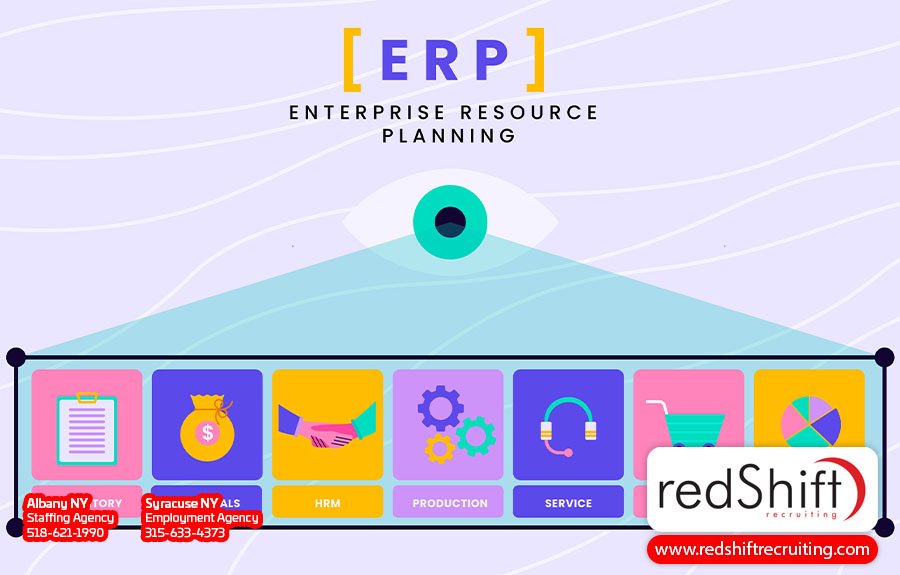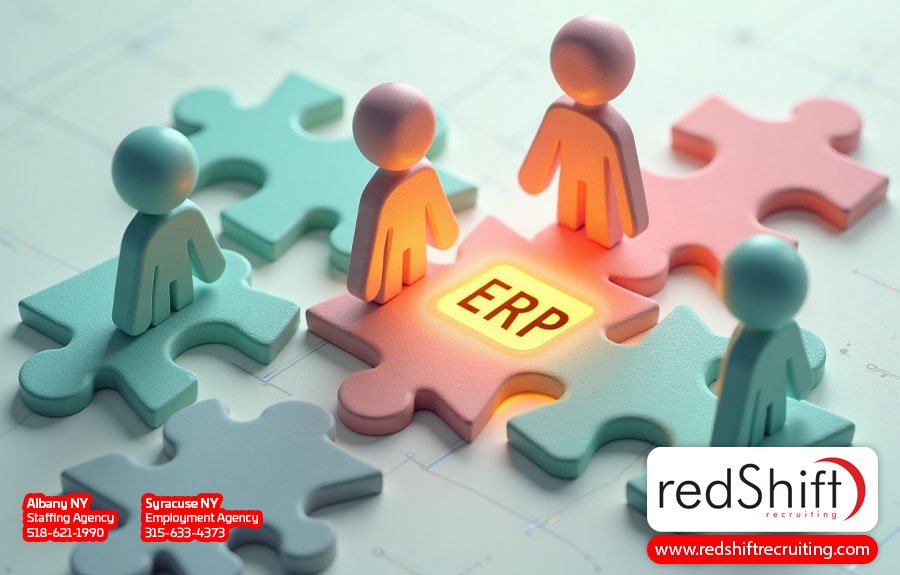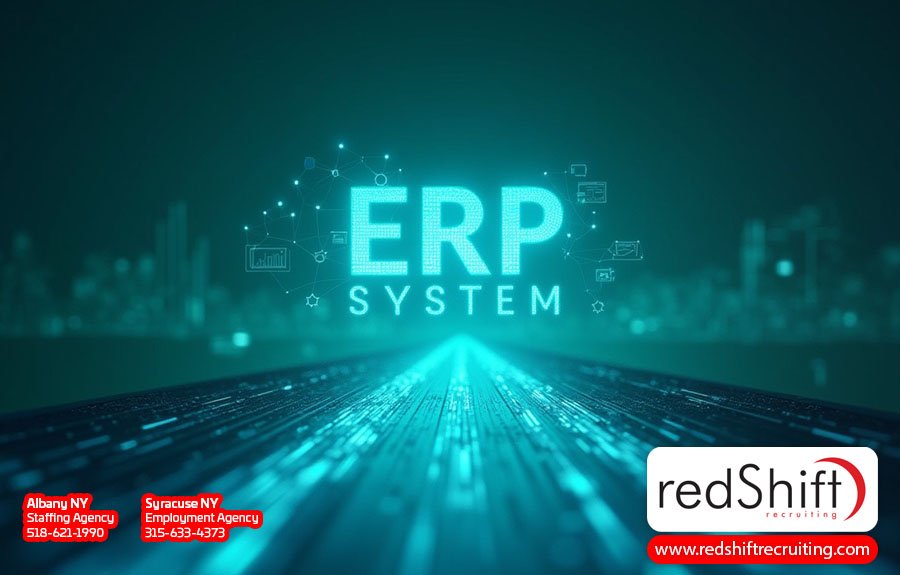How to Staff Your ERP Project: A Practical Hiring Guide
Enterprise Resource Planning (ERP) systems are designed to bring together key business functions like finance, operations, and supply chain into one centralized platform. When used effectively, they help companies improve efficiency, support scalability, and bring better visibility and coordination across teams. But a successful ERP rollout requires more than just choosing the right software or implementation plan. You also need the right people behind it.
ERP projects require a range of expertise, from planning and configuration to training and long-term support. The challenge is knowing who you actually need, when you need them, and how to balance internal resources with external help. This guide will walk you through how to staff your ERP project at every stage, whether you're a small business stretching your internal team or a large organization hiring specialized experts. You'll learn which roles are essential, what skills to prioritize, and how to build a team that sets your ERP implementation up for success. Let's get started!
Why ERP Implementation Requires the Right Team
Rolling out an enterprise resource planning (ERP) system is a big move that can reshape how your business runs day to day. And like any major shift, a successful transition hinges not just on the right software, but on having the right people to guide the implementation process. A strong, well-rounded ERP project team brings together a mix of skills across departments to make smart decisions, troubleshoot issues, and keep things moving forward. Whether it's staffing gaps, underqualified hires, or overstretched internal resources, poor staffing can quickly lead to painful delays, budget overruns, or a system that no one really uses.
What your team looks like depends a lot on your resources and your project goals. Because ERP implementations vary in size and scope, scalability matters. Small and mid-sized businesses may need to rely on key internal staff wearing multiple hats, while large corporations might bring in dedicated specialists for each project phase. Either way, strategic planning ensures you have the right expertise in place when you need it. This includes not only technical and functional team members who understand how to get the work done, but also the implementation team members who can support communication, manage change, and keep teams aligned throughout the transition. By matching the right expertise to each stage of the ERP implementation project, you'll keep your new ERP system on track and positioned to deliver results.
ERP Implementation Staffing Needs by Phase
Staffing your ERP project effectively means more than just hiring a few tech-savvy professionals. Each stage of the implementation process brings different challenges and priorities, requiring specific skill sets to move things forward. In small and mid-sized businesses, team members may take on multiple responsibilities, while in larger organizations, more specialized roles may be needed. Understanding who you need—and when—is key to building a team that can execute each phase of the ERP journey successfully.
1. Planning and Discovery (Laying the Foundation for ERP Success)
This initial phase lays the groundwork for everything that follows. Before you select an ERP vendor or define system requirements, your team must understand current processes, identify gaps, and clarify long-term business goals. The planning phase helps you develop a clear project roadmap that sets expectations and anticipates challenges while ensuring the new system will be strategically aligned with both business needs and technology capabilities.
ERP Project Manager – Leads the planning process, managing scope, timeline, budget, and risk, in addition to setting expectations and ensuring all team members are clearly aligned. In smaller companies, this person may also serve as a liaison with the implementation partner.
Business Analyst – Reviews workflows such as finance, human resources (HR), and inventory management to identify inefficiencies and translate them into ERP requirements. This ensures the ERP solution will support business goals. A skilled generalist business analyst can cover multiple functions in smaller teams.
IT Infrastructure Specialist – Evaluates current systems, integration needs, network security, and compatibility with ERP options. This role is particularly critical if you're considering on-premise solutions or significant customization.
Smart decisions during this phase help prevent downstream issues, especially when the project involves a significant investment of time and capital.
2. Project Kickoff and Requirements Gathering (Defining System Needs & Priorities)
Once the direction is set, it’s time to refine the project scope, set measurable project expectations, and dig into what the ERP system implementation truly requires. This is where business needs are translated into functional and technical requirements, preventing costly misalignment and ensuring critical business functions are properly addressed.
ERP Implementation Consultant – Works with internal teams to conduct detailed system analysis and translate operational needs into ERP functionality. External consultants can be a valuable short-term solution for organizations without internal bandwidth to fill this role.
Solution Architect – Designs the ERP framework, defining how different modules will integrate with existing software and workflows and ensuring smooth interactions and legacy system compatibility.
Data Analyst – Evaluates existing data quality and prepares it for migration, helping maintain project progress with clean and well-structured data.
Good project management is essential here, whether you hire a dedicated ERP project manager or assign an experienced internal leader.
3. System Configuration and Customization (Building and Testing the System)
Now it’s time to build. Your team configures the ERP environment, adapts it to reflect actual business processes, establishes security settings, and handles data migration from legacy systems. The level of customization often depends on your industry and whether you’re using a cloud-based or on-premise solution. Rigorous testing is required during this stage to ensure the new ERP system functions properly before deployment.
ERP Developer – Customizes workflows and modules to ensure the ERP software integrates with your existing tools and processes. This can include automation and any necessary system modifications.
Cybersecurity Specialist – Implements access controls, encryption, and monitoring to safeguard sensitive data and maintain compliance.
QA Engineer – Leads structured testing, including unit testing, integration testing, and user acceptance testing (UAT), to identify and fix defects, ensure data accuracy, and support user readiness.
Depending on your ERP type, some responsibilities may be handled by your technical team, while others—especially integrations—might be better managed by specialized technical consultants or external partners.
4. User Training and Change Management (Preparing Teams for the Transition)
You can build the perfect system, but it won’t matter if people don’t use it. This phase focuses on user adoption, from clearly communicating the benefits of the new system to training employees and providing strong internal support to help them adapt.
Change Management Specialist – Plans communication strategies and internal rollouts to reduce resistance and support a smoother digital transformation. This role is an invaluable member of the ERP implementation team, directly addressing user resistance and uncertainty and ensuring users have the support they need to adapt to new processes and system changes.
Training Coordinator – Develops role-specific learning materials and delivers comprehensive training using a mix of formats that may include hands-on workshops, video tutorials, user guides, cheat sheets, and more.
HR or Organizational Development Specialist – Supports long-term change initiatives by aligning ERP adoption with company culture, employee development, and daily operations. This role helps ensure that ERP becomes an integrated part of how teams work, not just a new tool they’re trained on.
Here, soft skills like empathy, patience, and clear communication are just as important as technical expertise. ERP success ultimately depends on the people who use it, and without buy-in, even the most advanced system can fall flat.
5. Go-Live and Stabilization (Launching the ERP & Troubleshooting Issues)
Congratulations! The system is live—but the work isn’t over. Your team needs to be ready to resolve technical hiccups, monitor performance, and assist users. Speed and responsiveness are critical during this high-stakes phase, where errors and confusion can create downtime and disruptions that quickly derail all the hard work of your ERP implementation team.
ERP Support Specialist – Acts as a front-line resource, handling early user questions and unexpected issues that arise after deployment. This includes troubleshooting both technical problems (like performance issues or system errors) and functional issues (such as broken workflows, access limitations, or unexpected system behavior from a user’s perspective).
System Administrator – Manages permissions, applies patches, and monitors ERP performance to ensure stability and ongoing support.
Help Desk Technicians – Offer immediate user support to address day-to-day concerns, resolve minor technical problems, and escalate complex technical challenges as needed.
You’ll need hands-on availability to ensure data accuracy, support your new ERP software, and maintain business continuity. With this team in place, you can navigate technical challenges, provide ongoing support, and ensure your new ERP system is stable.
6. Ongoing Maintenance and Optimization (Keeping the ERP Running Efficiently)
Post-launch doesn’t mean post-effort. Ongoing maintenance and continuous refinement help your ERP software stay efficient, secure, and adaptable to both specific business functions and future growth opportunities. Companies must continuously evaluate performance, apply system updates, and optimize workflows. In many organizations, this is where internal ownership gradually shifts from the implementation team to IT and business operations.
ERP Functional Consultant – Regularly evaluates how departments use the system and makes recommendations for streamlining and enhancing performance.
Database Administrator – Oversees data integrity, performance tuning, and system backups to support normal business operations and manage ERP system health.
Vendor Liaison – Maintains the relationship with the ERP vendor to coordinate system updates, troubleshoot technical issues, and relay critical system information to senior management.
A proactive, well-supported internal team helps ensure long-term project success and continued return on your ERP investment. Senior management must support this team to maximize the effectiveness of the system and ensure it is well maintained and optimized.
How to Handle Your ERP Staffing Needs
Building the right team for an ERP implementation doesn’t necessarily mean hiring a dozen new full-time employees. Especially for small and mid-sized businesses, sourcing each role can be a real challenge, as many hiring managers lack in-house ERP expertise. Additionally, depending on your budget, bringing on multiple full-time specialists for a one-time project may just not be realistic. Even larger companies may struggle to allocate the right mix of skills at the right time without stretching teams too thin.
Challenges Businesses Face in ERP Hiring
One of the most common obstacles in staffing ERP projects is a simple one: not having enough internal resources with ERP experience. Functional leads may understand your business processes, but they may not have worked with a new ERP system before. Hiring full-time experts for every specialized need—from data migration to cybersecurity—can be expensive, and the workload for those roles often drops off after implementation. It’s also not uncommon for companies to underestimate the amount of time and attention key team members will need to dedicate to the ERP project, leading to burnout or bottlenecks.
Options for Filling ERP Roles
There’s no one-size-fits-all strategy for ERP staffing, but there are flexible options that can help you get the right talent without overcommitting time or budget:
Cross-train internal employees to take on multiple responsibilities. A capable project team member may be able to cover more than one area if they receive the right support and training. This works well when responsibilities overlap across phases or for companies with strong generalists already in-house.
Hire contract professionals during critical phases. Short-term consultants or contractors can provide deep expertise when it’s needed most—such as during data migration, system configuration, or go-live support—without the long-term cost of a full-time hire.
Partner with an IT staffing agency that understands ERP needs. An experienced staffing partner can help you quickly find functional team members, ERP consultants, developers, or support staff who are a strong fit for your system and industry. This saves time and improves alignment between your project goals and the people driving them.
Blend internal and external expertise to optimize your budget and coverage. Many companies find success with a hybrid model—pairing internal subject matter experts who know your business with external specialists who bring niche ERP skills. This approach creates a nimble, cost-efficient ERP project team.
The key to ERP staffing is understanding which roles are essential to your ERP implementation process, when you need them, and how long you’ll need them. Strategic planning now prevents hiring regrets later—and supports a successful ERP implementation team that is lean, capable, and focused on results.
Staffing Strategy Tips for ERP Projects
Once you've identified your resourcing options, it's important to plan ahead to avoid potential issues. What could slow you down? Where do companies typically misstep? How can you build a team that stays effective from kickoff through post-launch? Here are a few practical tips to help you avoid common pitfalls and plan smarter:
Don’t underestimate the time commitment. ERP projects often demand more attention than expected—especially from internal staff who may already be overwhelmed.
Plan for a ramp-up period. Even experienced contractors need time to get familiar with your business, workflows, and data structure. Don't forget to build that into your timeline.
Prioritize continuity. Roles like System Administrator and Functional Consultant are essential long after go-live. Plan to retain or transition those responsibilities post-launch to avoid operational gaps.
Think beyond go-live. Stabilization and user support phases require just as much attention as earlier stages. Start identifying support personnel early so you're not scrambling once the system is live.
Be ready to scale your team. Your staffing needs will shift throughout the project. Keeping flexibility in your plan is key to scaling up or down as needed.
Document everything. Knowledge retention is key—especially if you're using external consultants or contract employees. Ensure systems, processes, and configurations are documented for your internal team and adequate training is provided before contractors roll off the project.
Key Takeaways & Next Steps
Successfully staffing your ERP project doesn’t mean hiring the biggest team—it means hiring the right team at the right time. Whether you're working with limited internal expertise or scaling for efficiency, a thoughtful staffing plan helps avoid delays, burnout, and mismatched hires.
Here’s how to move forward:
Identify the roles your business needs. The planning phase lays the foundation for a successful ERP implementation project. Use the ERP roadmap you develop to define key responsibilities for each phase and determine whether those roles can be filled internally or externally.
Evaluate internal skill gaps. Be realistic about whether your current team has the time and expertise to take on ERP-specific tasks like data migration, system testing, or user training.
Consider contract vs. full-time hires. Many ERP roles are phase-specific. Contractors can fill short-term needs without overcommitting your budget or headcount.
Leverage IT staffing support. A trusted staffing partner can connect you with qualified ERP professionals—from implementation consultants to help desk support—at the right moments.
Plan beyond go-live. Post-launch roles like system administrators, ERP support, and optimization consultants are critical for long-term success. Start planning for them early to avoid delays, resource gaps, and post-launch chaos.
Focus on outcomes, not just roles. With the right team in place, your ERP system can deliver streamlined business processes, stronger data visibility, and improved decision-making across your organization.
Document and transfer knowledge. If you’re bringing in short-term experts, make sure their processes, configurations, and system knowledge are captured before they roll off the project.
Frequently Asked Questions
What Roles Do I Need to Hire for an ERP Implementation?
ERP projects require different roles at each phase, including project managers, business analysts, ERP consultants, developers, and training leads. Post-launch roles like ERP support specialists and system administrators are also essential for long-term success. The right mix depends on your internal capacity, system complexity, and project goals. A well-planned staffing approach ensures you're covered from discovery to optimization.
Should I Hire Full-Time Employees or Contract Professionals for ERP Implementation?
It depends on your timeline, budget, and the roles you need to fill. Full-time employees offer continuity and internal knowledge, while contractors bring specialized skills for high-demand phases like data migration or testing. Many organizations benefit from a hybrid approach, keeping strategic roles in-house and bringing in outside experts where needed.
How Do I Decide Which ERP Roles to Staff Internally vs. Externally?
Start by evaluating your internal team's skills and availability. Roles that rely on business knowledge—like business analysts or change management leads—are often best filled internally. For highly technical or short-term needs, such as ERP developers or cybersecurity specialists, outsourcing can save time and reduce costs. Blending both allows you to stay agile and resource-efficient.
What IT Roles Are Needed for ERP System Configuration and Customization?
This phase typically requires an ERP developer, solution architect, and cybersecurity specialist. These professionals handle system setup, create custom workflows, manage integrations, and ensure security compliance. Larger projects or on-premise implementations may also need technical consultants or systems engineers to support the infrastructure and legacy system alignment.
Who Provides Support After an ERP System Goes Live?
Support after go-live is usually managed by ERP support specialists, system administrators, and help desk technicians. These roles handle technical troubleshooting, user issues, software updates, and system monitoring. Planning for this team early ensures smoother adoption, fewer disruptions, and long-term ERP success.
Conclusion: Why the Right People Matter
Staffing an ERP project isn’t just about filling seats—it’s about making intentional decisions that support each phase of implementation. Whether you're navigating a full-scale rollout or a targeted system upgrade, having the right people in the right roles at the right time can make the difference between a system that simply works and one that transforms how your business operates.
By understanding the expertise required at each step and weighing your internal capabilities against external options, you can build a team that supports both short-term execution and long-term ERP success. With thoughtful planning and the flexibility to scale, your ERP implementation can deliver real value, drive streamlined business processes, and position your organization for lasting growth.
Article Author:
Ashley Meyer
Digital Marketing Strategist
Albany, NY







